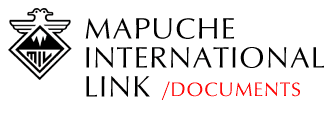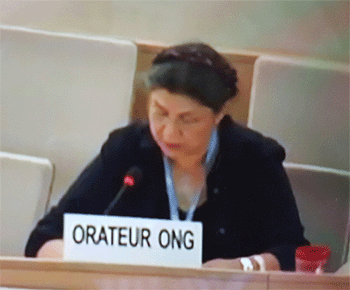
 |
|
|
| Home
| Front Page
| News
| Documents |
Environmental
| Archive
| Discussion
Point Links | About Us |
|
Presentation by Flor Calfunao Paillalef at the 32nd Session of the UN Human Rights Council Human Rights Council Item 9. Racism, racial discrimination, xenophobia and related forms of intolerance, follow-up to and implementation of the Durban Declaration and Programme of Action General Debate Statement by Auspice Stella Thank you Mr President: The Durban Declaration, in its section on racism and discrimination, clearly states that threats and aggression are attacks on human liberty and dignity and that combatting them is a priority for the international community. The Mapuche people are daily subjected to such aggression without the Chilean or Argentinian authorities implementing mechanisms for their prevention.
For its part the International Convention on the Elimination of all Forms of Racial Discrimination insists that the state party is committed never to carry out any act or practice of racial or other form of discrimination and advocates for the ‘right to freedom of thought, conscience and religion.’ However, the Chilean authorities neither respect nor make the distinction between a political meeting and a religious congregation, nor respect the private nature of these gatherings that the Mapuche people take part in within their own communities. The Chilean authorities confuse religious gatherings with conspiracy meetings. On the 30th and 31st of September 2012, the Machi (religious authority or shaman) Lincanao conducted a religious ceremony called Gneiku-rewen with members of her community. Present at this religious act were persons who later became involved in a case of attempted murder. Right now, eleven people are in preventative detention accused of the crime that, according to the prosecutor, had been planned in the above mentioned ceremony – something extremely improbable given the religious nature of the meeting. The lack of understanding of the culture and spirituality of indigenous peoples within Chilean society is a reflection of the prevailing intolerance in the country towards other cultures. Finally, we support the recommendations of the Special Rapporteur on extreme poverty and human rights based on their mission in Chile (in March 2015), when they strongly urged the government to respect its obligations under ILO Convention 169 on indigenous peoples – the Special Rapporteur is just one of many observers that don’t consider the government to be doing so in actuality. Thank you Mr President, Flor Calfunao Paillalef ________________________ Translated by James Edwards
|
| |
||
|
||
